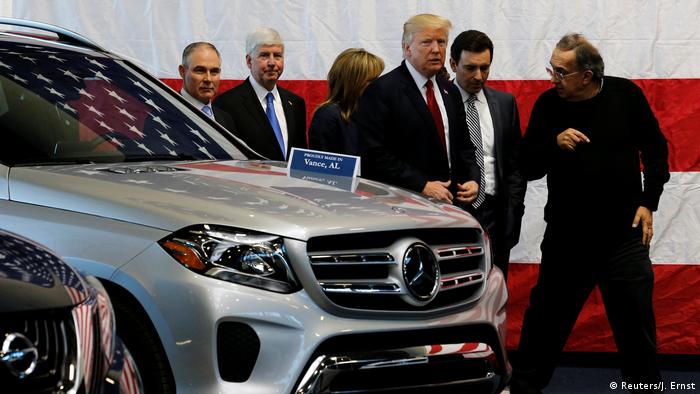Are says the Germans are “evil, very evil” – as the American President Donald Trump apparently? He’s angry, especially about the German car industry, which reportedly sold a million cars in the United States.

“Look at the millions of cars they sell in the USA. Terrible. We are going to stop.” So Trump had made after information of the news magazine “The mirror”, compared to EU Council President Donald Tusk and EU Commission chief Jean-Claude Juncker. The industry is not specifically on the allegations.
But the Numbers speak for themselves: for example, German car manufacturers have produced in the past year, about 850,000 cars in the United States. That was four times as much as 2009, the industry Association VDA. But overall, just under two-fifths are sold in the United States, more than 500,000 vehicles are exported.
The United States is for the German manufacturer, in the meantime, the second-largest foreign location of production to China, according to the VDA: And also the suppliers have in the last two decades, the number of its locations in the United States tripled to 265. And German manufacturers and suppliers employ in the United States, more than 110,000 people.

In the USA, the largest BMW factory in the world. And who is the largest car exporter in the US market? Right: BMW.
BMW is a “National Hero”?
“The largest Car exporter from the United States is not General Motors or Ford, but BMW group headquarters in Germany”, says Galina Kolev, trade expert of the Institute of the German economy. The Statements of Trumps were “loud shouting without substance”, says Ferdinand Dudenhöffer, Director of CAR Automotive Research Center at the University of Duisburg-Essen. You could refer to a BMW as a “National Hero” of the USA. Because the Munich-based made in the past year alone, some 45,000 cars more in the US than they sold there.
In the case of Daimler, the proportion of production and sales is, for example, in the past year, however, were sold 19,000 vehicles more than made there.
Only the VW group has a point of view Trumps a worse balance sheet: In the past year 526.000 Volkswagen, Audi, Porsche, Bentley and Lamborghini were sold in the United States, but only 75.000 manufactured there. The reason is that Audi and VW also produce in Mexico, Porsche has no production in North America. “In addition, the VW had a plant in Chattanooga, a very poor utilization, which is improved in 2017 by new products significantly,” says car expert Dudenhöffer. Chattanooga had been planned for a production capacity of 150,000 vehicles, with extension in the direction of 200,000.
The curse of the “alternative facts”
The Germans had, according to the VDA, 2016 in the United States with a market share of 7.6 percent, the share of car manufacturers in the United States in Germany was approximately twice as high at 13.5 percent. The mostly Fiat-Chrysler, Ford, General Motors and Tesla. “As is so often the US President argued on the location of the facts, but creates its judgments through alternative facts, about how many cars he sees on a street in New York, or which cars just in the Trump Tower Parking,” says car expert Dudenhöffer these Figures.
Nevertheless, a certain restlessness, the call of his Remarks on the financial markets. Because the prices of the major car manufacturers gave in yesterday.

The German market share in the United States: 7.6 percent, the U.S. share of the German market: 13.5%. Production at Ford in Cologne.
Fear of the duties remains
The concern remains that the American President could pursue its plans for a “Border Adjustment Tax”, a tax Border tax adjustments, and more. Such a tax, a surcharge on imported Goods and services, would increase the price of the products on the market in the United States.
However, this only applies for the companies to import more to the USA than from export. To VW, the German car industry would not be affected so strongly.
Otherwise, this would be for the industries that provide more in the USA than you are from there. This should be done in the context of a tax reform, would not foresee the effect, however, to bring such A comprehensive tax reform through the legislative process is lengthy, says Galina Kolev from the Institute of the German economy. Duties it considers to be unlikely, and would probably immediately draw an action brought by the trading partner in the United States.

